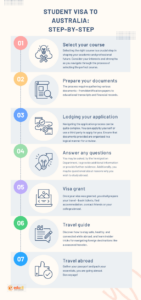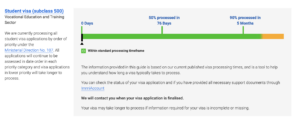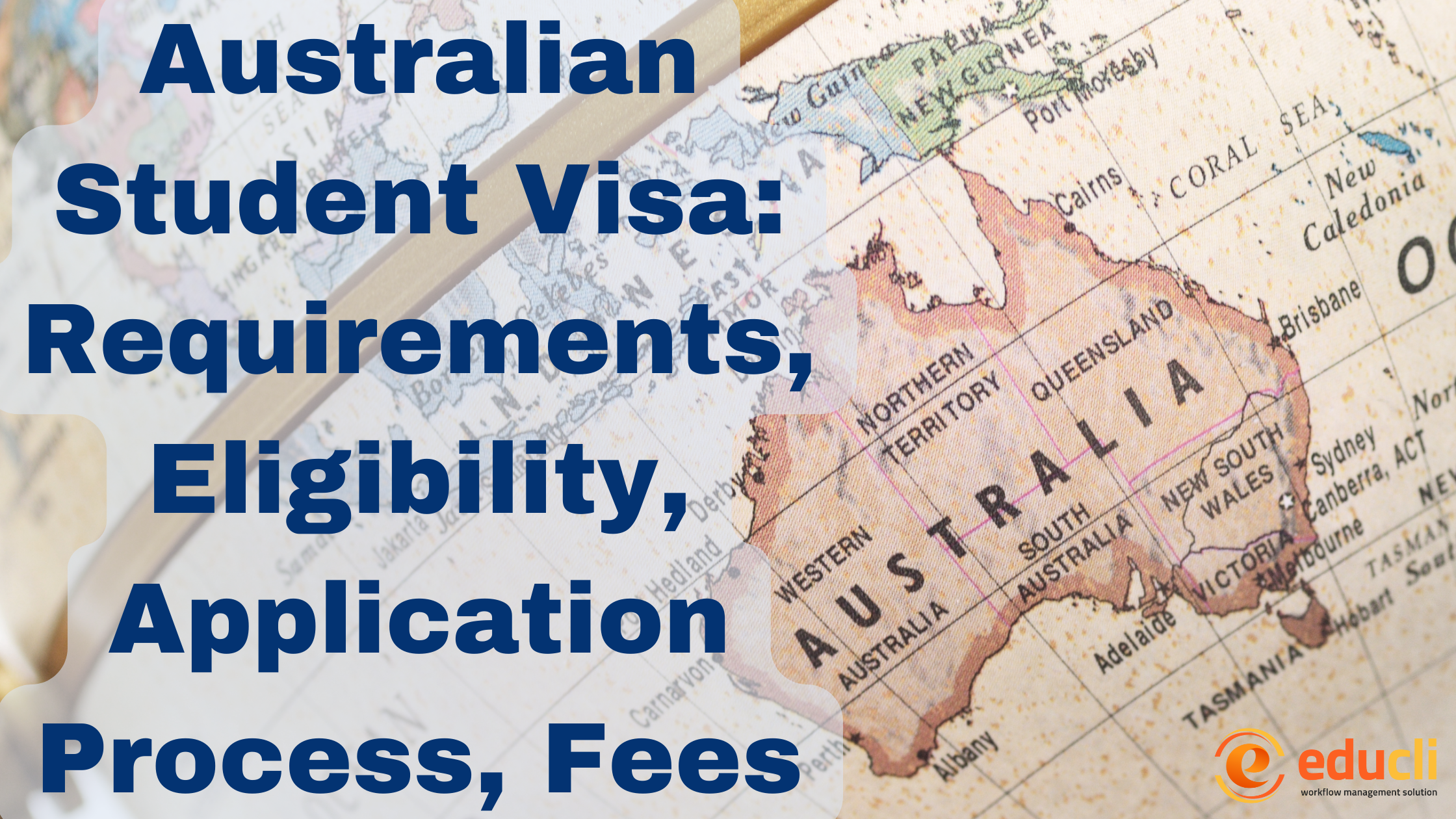Australian Student Visa: Requirements, Eligibility, Application Process and Fees
Over the past twenty years, Australia has become a popular travel destination, primarily because of its favorable lifestyle, close proximity to Asia, and high level of safety. The majority of students choose to pursue their education in Australia as their academic destination. Additionally, up until relatively recently, there were significantly more opportunities for international students to obtain permanent residency in Australia.
What is an Australian student visa?
Before we dive into the process of how to get an Australian student visa, let us first understand what is an Australian student visa.
A student visa to Australia will allow you to travel and live in Australia for a specific amount of time. Australia does not affix visa stamps or labels to students’ passports any longer. There are, however, visa conditions attached to the visa, and it is important that you keep a copy of your visa grant and observe the conditions.
What can your Australian student visa do for you?
Once you are granted your Australian Student Visa, you will be able to do the following:
- Enrol in eligible courses in Australia.
- Bring family members with you (please note, conditions apply).
- Travel to and from Australia.
- Work up to 48 hours every two weeks after the beginning of the academic course.
- Apply for another visa (if you meet the requirements)

Admission process
Offer letter
If the institute is satisfied with your application, the supporting documents, and the possibility of an interview, the education provider of your choice will send you a letter of offer. Read the offer letter carefully before accepting it. This is one of the things you need to keep in mind when you receive the letter of offer. It will include information on your course, the requirements for enrolling, and the fees for the Australian student visa that you are required to pay if you accept the offer; therefore, it is an essential component of the requirements for the Australian student visa.
Confirmation of Enrollment
Once the offer has been accepted and payment has been made, the institute will confirm the offer. The institute will issue a CoE, which stands for “Confirmation of Enrollment,” to attest to your enrollment in a particular class as soon as they have received the funds. You are required to submit a Certificate of Eligibility (CoE) along with your application for an Australian student visa to the government of Australia.
Required documents for your visa application
You can get a list of the documents needed on the Australian Department of Home Affairs website’s document checklist tool. You are typically required to submit the following evidence:
- Valid Passport
- Pay Immigration visa application fee
- Proof of enrollment sent by your provider – (eCoE) certificate
- Genuine Student statement / Statement of Purpose
- Evidence of your academic and work experience
- Your travels in last 10 years
- Health and Character declaration (please note that medical and police checks may be requried)
- Evidence of financial support (please note that evidence of having funds available may be required at the time of application)
- Evidence of having required level of English (please note that evidence may be required at the time of application)
The immigration visa charges (*As of April 2024), an unavoidable expense for international students. For the initial application, students are required to pay AUD$710 plus a credit card surcharge. If additional visa are lodged in Australia, than there is an additional fee of AUD$700 plus the credit card surcharge per application. Bringing family members along incurs an additional AUD$530, equating to $175 per applicant.
Proof of funds
Summary of new funding evidence requirements for student visa applications from 1 October 2023:
- Primary applicant: AUD$24,505
- Spouse: AUD$8,574 (35%)
- Child: AUD$3,670 (15%)
- School fees
- Course fees for the first 12 months, less any fees already paid
- Travel expenses
Acceptable sources of funds:
- Bank statements
- Bank certificates
- Bank deposits
- Education loans
- Business loans (if evidence of disbursement is provided)
What documents?
- Bank statements showing that they have at least AUD$24,505 in savings in their own name or in the name of their parents or guardians.
- Scholarship or sponsorship letters from recognized organisations.
- Letters from their parents or guardians stating that they will support them financially while in Australia.
- Evidence of employment income, such as pay slips or tax returns.
- Evidence of other assets, such as property or investments.
What happens if they do not meet the new funding evidence requirement?
If they do not meet the new funding evidence requirement, their student visa application will be, more likely, refused.
Tips for submitting strong financial evidence
Here are some tips for submitting strong financial evidence for a student visa application:
- Make sure that the funding evidence is recent. The Australian government recommends submitting evidence that is no more than 3 months old.
- Bank statements should show regular deposits to their bank account.
- A scholarship or sponsorship letter must come on company letterhead, including the contact details of the person providing it.
- A letter from their parents or guardians, ensuring that all relevant parties signed the document.
- Pay slips or tax returns, ensure that they are from a legitimate employer.
- Evidence of other assets, such as property or investments, ensures that they are accurate and up-to-date.
Genuine Temporary Entrant (GTE)
The Australian Government has replaced the Genuine Temporary Entrant (GTE) requirement for student visas with a Genuine Student (GS) requirement. This is effective for student visa applications lodged on and after 23 March 2024.
All applicants for a student visa must be genuine applicants for entry. They must stay as students and be able to show an understanding that studying in Australia is the primary reason for their student visa. The GS requirement is intended to include students who, after studying in Australia, develop skills Australia needs and who then go on to apply for permanent residence.
To be granted a student visa, all applicants must demonstrate they satisfy the genuine student criterion or the genuine student dependent criterion.
In the online student visa application form, we will ask the applicant the below questions to address the GS criteria.
- Give details of the applicant’s current circumstances. This includes ties to family, community, employment, and economic circumstances.
- Explain why the applicant wishes to study this course in Australia with this particular education provider. This must also explain their understanding of the requirements of the intended course and studying and living in Australia.
- Explain how completing the course will be of benefit to the applicant.
- Give details of any other relevant information the applicant would like to include.
Answers must be written in English, with a maximum of 150 words per question (on the online application form).
There is an additional question for those applicants who have previously held a student visa or those who are lodging an application in Australia from a non-student visa.
Health and character requirements
As an Australian student visa applicant, you are required to meet certain health and character requirements. One of these requirements involves undergoing a medical examination to assess your fitness for studying in Australia. This examination helps ensure that you are in good health and able to cope with the demands of academic life in Australia.
Additionally, you must demonstrate good character, which may involve providing police clearance certificates or other documentation to verify your background. These requirements are in place to maintain the safety and well-being of the Australian community and uphold the integrity of the student visa program.
Oveseas Students Health Cover (OSHC) – insurance
Most applicants must purchase Overseas Student Health Cover (OSHC) from a recognised Australian provider in addition to the medical examination. OSHC is one of the significant expenses for international students in Australia. For a single person, the monthly insurance fee ranges from AUD$50 to AUD$60. It’s important to note that applicants must purchase the OSHC upfront for their entire stay in Australia!

Australian student visa application process
The revised Simplified Student Visa Framework (SSVF) Guidelines have made the Australian student visa application procedure more straightforward.
How to apply?
You can easily apply online for an Australian student visa using the ImmiAccount (Immigration Account. The online application system lets you submit your application and upload any supporting documents.
Steps in the application process:
- Create an ImmiAccount and log in.
- Fill out the corresponding visa application form for the required eligible subclass.
- Provide personal, details, passport details, address, and email.
- Attach any required or additional documents to support the application.
Once you submit your application, you will receive a Transaction Reference Number (TRN), which is a unique number, that allows you to check the status of the application or communicate with the department.
As of April 2024, some 50% of applications for higher education are processed within 76 days of submission, and 90% of applications are processed in 5 months. It could take longer if there are issues with supporting documents or gaps in the application. Biometric information from students may be requested as part of the application process, which will appear in their Australian Immigration Account.

(Source Department of Immigration)
After you apply for your visa, you will be appointed a case officer. Based on the information provided at your application, the course, your country of origin, and some other factors, your student visa for Australia will be approved or denied. You may be also asked to provide additional information, or explanations, or attend an interview.
You will receive an email with the outcome of your application. If in Australia, you have rights to appeal this decision.
Tips for your visa compliance
As soon as you are granted your student visa, you will be granted certain rights, but you will also be obligated to fulfill certain responsibilities.
- Maintain a good attendance record and academic progress through your course/s
- Provide your Australian address of residency to your education provider (it is your responsibility to update your personal details, including address, email, or phone number, within 7 days of any change).
- Work within work rights limitations
You now have all the information you required to receive a student visa for Australia! Access our free comprehensive guide for more information about study, live and travel in Australia.
Once you have obtained your visa and are prepared to begin your journey as a student, you should visit the partner page in order to locate fully furnished accommodations.
Our free resume builder is available to you so that you can get a head start on your job search.
In order to take advantage of the discounts that are available to you as a student who is moving to Australia, you should inquire about obtaining a student card.
Related links:
Most Common Rejection Reasons for Australian Student Visa Applications
What is the real price for international students in Australia?





Leave A Comment